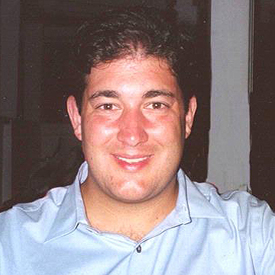‘Conflicts in the Caucasus’ course at Rutgers was underwritten by friends of victim

Students in a new Rutgers course, “Conflicts in the Caucasus: Ethnic Separatist Movements in Comparative Perspective,” will be doing more than learning of frictions and animosities that divide brothers in often deadly disputes – although that’s a key component.
They also will be celebrating the life of a young man killed in the September 11, 2001, terrorist attacks on the World Trade Center, a man whose grieving mother hopes the course this semester will be a healthy first step in addressing the type of bitter animosity that led to Peter Edward Mardikian’s murder.
“Peter died of a violent act, and the whole area in the Caucasus has seen a lot of violence, hatred, and anger,” said Shakeh “Jackie” Mardikian, medical and pharmaceutical sciences librarian at Rutgers’ Library of Science and Medicine on the Busch Campus. “Only through acts of kindness and education can we thwart acts of hatred. Hopefully, a course like this can minimize some of the violence in the world.”
Just 29 at the time of the attack, Peter Mardikian was a sales and marketing manager for Imagine Software, Inc. A frequent guest lecturer on risk management, he came to Windows on the World, the restaurant on the 106th floor of the towers, that cloudless Tuesday morning to make a presentation at a technology and financial trade show.
Six weeks earlier, he had married his college sweetheart, Cori.
“Peter didn’t have a selfish bone in his body,” said Jackie Mardikian. “He just wanted to give of himself. He loved people, and he loved having fun. He knew how to enjoy every minute of his life.”
The urge to memorialize that life drove banker G. Haig Ariyan, with his wife Nadine, to underwrite the Rutgers course in memory of his childhood friend. The two men grew up as children of Armenians who fled to the United States to escape persecution and discrimination. Their fathers, Alec Mardikian and Levon Ariyan, were close friends who had settled in Egypt as survivors of the Armenian genocide of 1915, which claimed the lives of more than 1.5 million Armenians at the hands of the Ottoman Turkish government.
“After September 11, it really struck me that this same type of fundamentalism, turned into fanaticism, was what killed Peter Mardikian, son of an immigrant who escaped that behavior overseas,” said Ariyan, a Managing Director of Deutsche Bank in New York and head of its Private Client Services department. “The irony is torturous.”
A 1993 graduate of Rutgers College with a bachelor’s degree in political science, Ariyan said he takes pride in knowing there is an Armenian Studies program at his alma mater.
Teaching the upper-class course – cross-listed in the fields of geography and Armenian studies – is John Antranig Kasbarian, a former editor of The Armenian Weekly and current program director for the nonprofit Tufenkian Foundation. The New York-based organization pursues a social-protection agenda, including small-business development, economic recovery, and resettlement of internally displaced persons.
“Peter, from what I gather, had a very healthy appetite for Armenian politics and current affairs in the region. I think he probably would have devoured this subject matter,” said Kasbarian, who received his Ph.D/ in geography from Rutgers in 2004.
As a freelance journalist, he traveled to the Caucasus in 1993, covering the war in Nagorno-Karabakh. His lectures will offer an overview of ethnic and separatist movements in Abkhazia, Chechnya, and Ossetia, with Nagorno-Karabakh as the major case study.
“After a long period of quiescence, the demise of the Soviet Union signaled a new era in relations among ethnic groups, and there emerged a number of separatist struggles, where ethnic republics sought to secede from larger nation-states,” said Kasbarian of the region that stretches roughly from the Black Sea to the Caspian Sea.
James Sahagian, who graduated from Rutgers College in 1993 and went on to earn his master’s in business administration from the university, chairs the Committee for Armenian Studies at Rutgers. When plans for the course were in their early stages, he reached out to Kasbarian to serve as its instructor.
Of Armenian descent on both sides of his family, Kasbarian did his dissertation on the topic “We Are Our Mountains: The Geography of Nationalism in the Armenian Self-Determination Movement, Nagorno-Karabakh, 1988-1998.” He said his hope and expectation for the course is that it will attract a mix of students across a wide spectrum of disciplines, including but not limited to geography, political science, and Armenian studies.